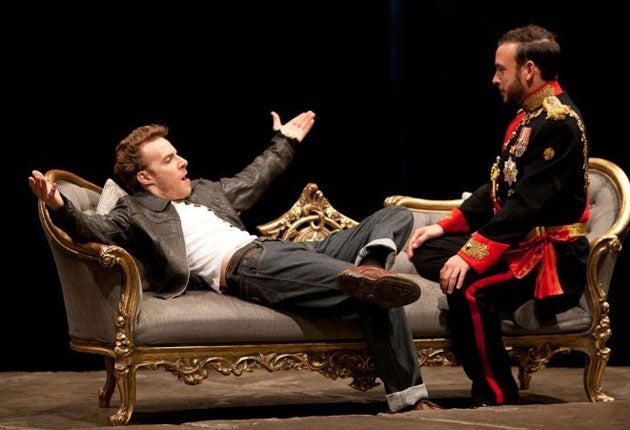Edward II, Royal Exchange Theatre, Manchester

Your support helps us to tell the story
From reproductive rights to climate change to Big Tech, The Independent is on the ground when the story is developing. Whether it's investigating the financials of Elon Musk's pro-Trump PAC or producing our latest documentary, 'The A Word', which shines a light on the American women fighting for reproductive rights, we know how important it is to parse out the facts from the messaging.
At such a critical moment in US history, we need reporters on the ground. Your donation allows us to keep sending journalists to speak to both sides of the story.
The Independent is trusted by Americans across the entire political spectrum. And unlike many other quality news outlets, we choose not to lock Americans out of our reporting and analysis with paywalls. We believe quality journalism should be available to everyone, paid for by those who can afford it.
Your support makes all the difference.It's not often that you encounter one of Gaveston's entourage, already in character, half an hour before the curtain call in a queue at the bar. But one of the smartest tricks of Toby Frow's production of Edward II, which opens in 1950s France, is the re-creation of the Parisian Mars jazz club for his audience to drink in the ambiance before they are transported to it. There are no half measures: the drummer, saxophonist and double-bass player performing a jazz gig at 7pm turn out to be players half an hour later. The casting director was looking for actors equal to a demanding musical repertoire.
Frow selected the 1950s for Marlowe's exploration of the gay king because it was a world which was beginning to explore homosexuality. The production initially sizzles with the sexuality of a gyrating Gaveston (Samuel Collings) – eye shadow, tight jeans and six pack, like some prototype Marc Almond – and the tension he brings from the Mars club to the stiff, stuffy English court. Edward's passion is so great that he just cannot keep it buttoned up in the name of realpolitik. The early scenes capture excellently the collision of courts, as London recoils queasily from the kisses. It's not romance we see in Collings's excellent Gaveston; there's a complexity and malevolence about him. Nothing is left to the imagination when he anticipates "those parts that men delight to see."
Edward's giddy capitulation to all of this makes it hard to find too much blame in Edward's Queen Isabella (Emma Cunniffe) and the Machiavellian Mortimer (Jolyon Coy) seems to have fairly good grounds for his machinations against the king. Their characters do not crackle with the same tensions and indecisions. We are left wanting more malevolence in their plotting.
But as the play's tone darkens, there is a remarkable finale. Edward's torture, in jump suit and hood, up to his knees in water, carries echoes of 21st-century rendition. Transfixing, also, is the play's climactic death scene. The executioner is Collings, who has swapped the Gaveston role for that of an eerie, chilling Lightborn. Look out for a remarkable piece of theatrics, which includes the dead Edward lying face down in water. The jazz theme ebbs away too quickly, but drink it in while it lasts. Time your arrival for an hour before curtain call and join the cast at the bar.
To 8 October (0161 833 9833)
Join our commenting forum
Join thought-provoking conversations, follow other Independent readers and see their replies
Comments